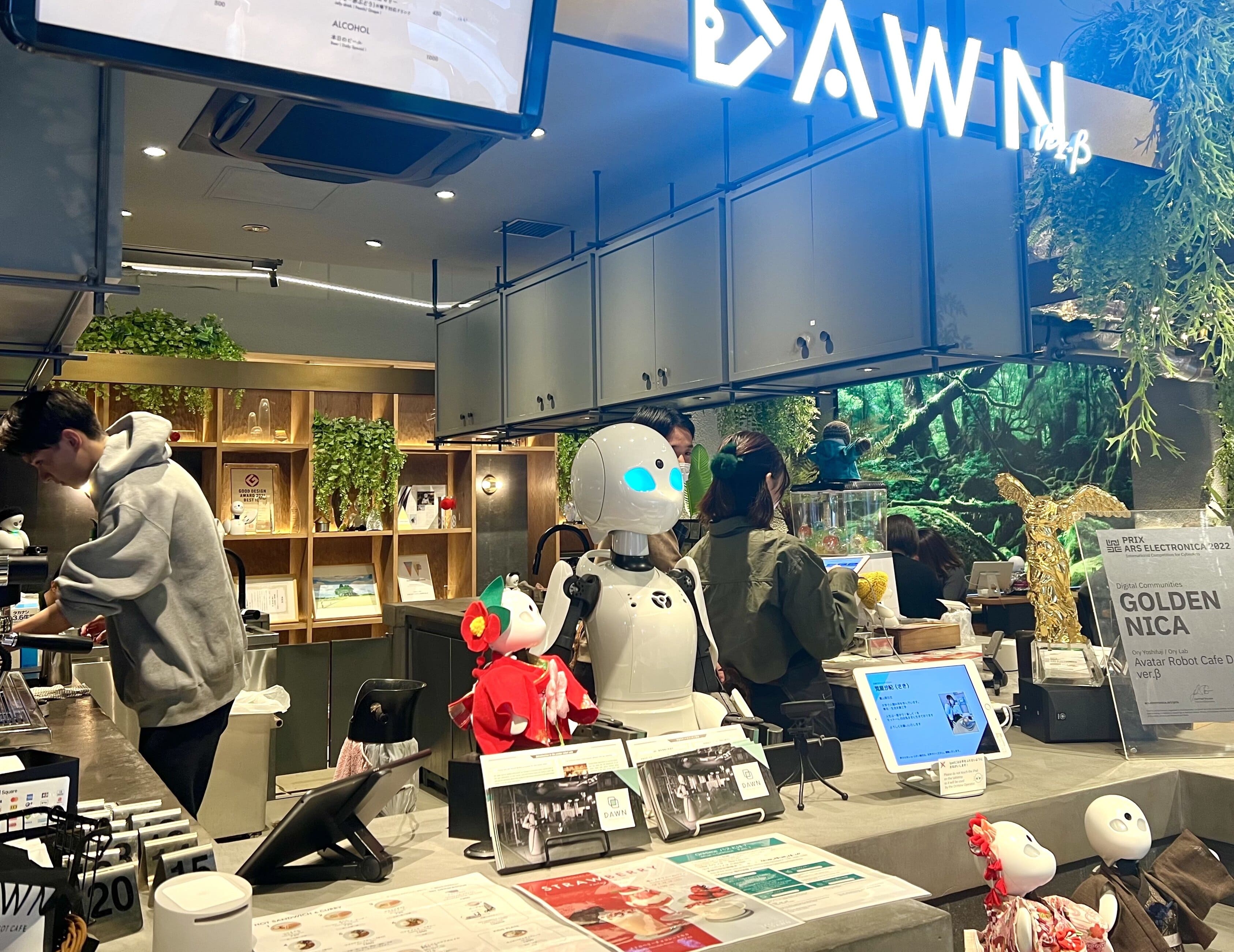By Glendalys Valdes
Medill Reports
TOKYO — In Japan, only 19% of working-age people with disabilities are employed, according to a Bloomberg calculation, but Dawn Avatar Robot Cafe in Tokyo challenges those barriers by employing people who have physical disabilities and are otherwise unable to work.
Ory Laboratory, the company that built and opened the cafe in 2021, created OriHime, a robot that can be controlled from a smartphone or tablet and can be used to see, hear and talk. Through OriHime, employees can interact and engage with customers even while working from home.

“I work at this cafe where I can work remotely through a remote-control OriHime robot,” said Nanaka, 18, an Avatar Robot Cafe employee, who is home-bound. She has worked at the robot cafe for the past three months.
Currently, more than 60 employees work at the cafe and operate the robots. All of the employees have physical disabilities ranging from ALS to multiple sclerosis.
Halfway around the world, researchers at the University of Chicago’s Human-Robot Interaction Lab also hope to develop social robots.
“I think robots have incredible potential to assist people,” said Sarah Sebo, assistant professor of computer science and director of the HRI Lab.
“As robots become hopefully a little bit cheaper, more robust, more capable of communicating with people, we could see things like robot house assistance that could maybe allow an older adult to stay independent in their home for longer,” Sebo said.

HRI Lab researchers hope to improve human-to-human interactions and inclusion for the elderly and disabled.
“There are definitely a lot of ways that robots could be utilized in order to help people,” Sebo said. “I think that in order to do all of this, though, there are a lot of social interactions that will happen between people…which can be used to improve a robot’s understanding of group dynamics.”
Transcript:
VALDES: In the bustling streets of Tokyo, Japan, this cafe is not just serving up coffee.
Welcome to the Avatar Robot Cafe. A place where people who have physical disabilities are able to work.
In Japan, only 19% of working-age people with disabilities are employed. But here, those barriers are challenged.
NANAKA: “Thank you for coming today.”
VALDES: Nanaka is 18 years old and has worked at the robot cafe for the past three months.
NANAKA: “I work at this cafe where I can work remotely, (through) a remote-controlled OriHime robot.”
VALDES: The Ory Laboratory created the advanced avatar robot named OriHime, where employees can operate it remotely from their homes or hospital rooms.
There are currently over 60 employees who operate the robots and have disabilities ranging from ALS to multiple sclerosis.
This couple from Finland visited the cafe to experience the robot interaction.
CUSTOMER: “It has been quite nice and it’s a really interesting idea.”
VALDES: Halfway around the world in the University of Chicago, the Human-Robot Interaction lab also hopes to develop social robots.
SARAH SEBO: “I think robots have incredible potential to assist people for example, as robots become hopefully a little bit cheaper, more robust, more capable of communicating with people, we could see things like robot house assistance that could maybe allow an older adult to stay independent in their home for longer.”
VALDES: Their main research is to improve human to human interactions by promoting inclusion.
SEBO: “There are definitely a lot of ways that robots could be utilized in order to help people and maybe provide a price point that might be more affordable for people.”
“I think that in order to do all of this though, there are a lot of social interactions that will happen between people.”
VALDES: The avatar robot cafe is steps ahead into the future of dining with the ultimate blend of technology and inclusion. From Tokyo, Japan, this is Glenda Valdes.
Glendalys Valdes is a graduate investigative journalism student at Medill. You can follow her on Instagram at @glenda.valdes or connect with her on LinkedIn.

